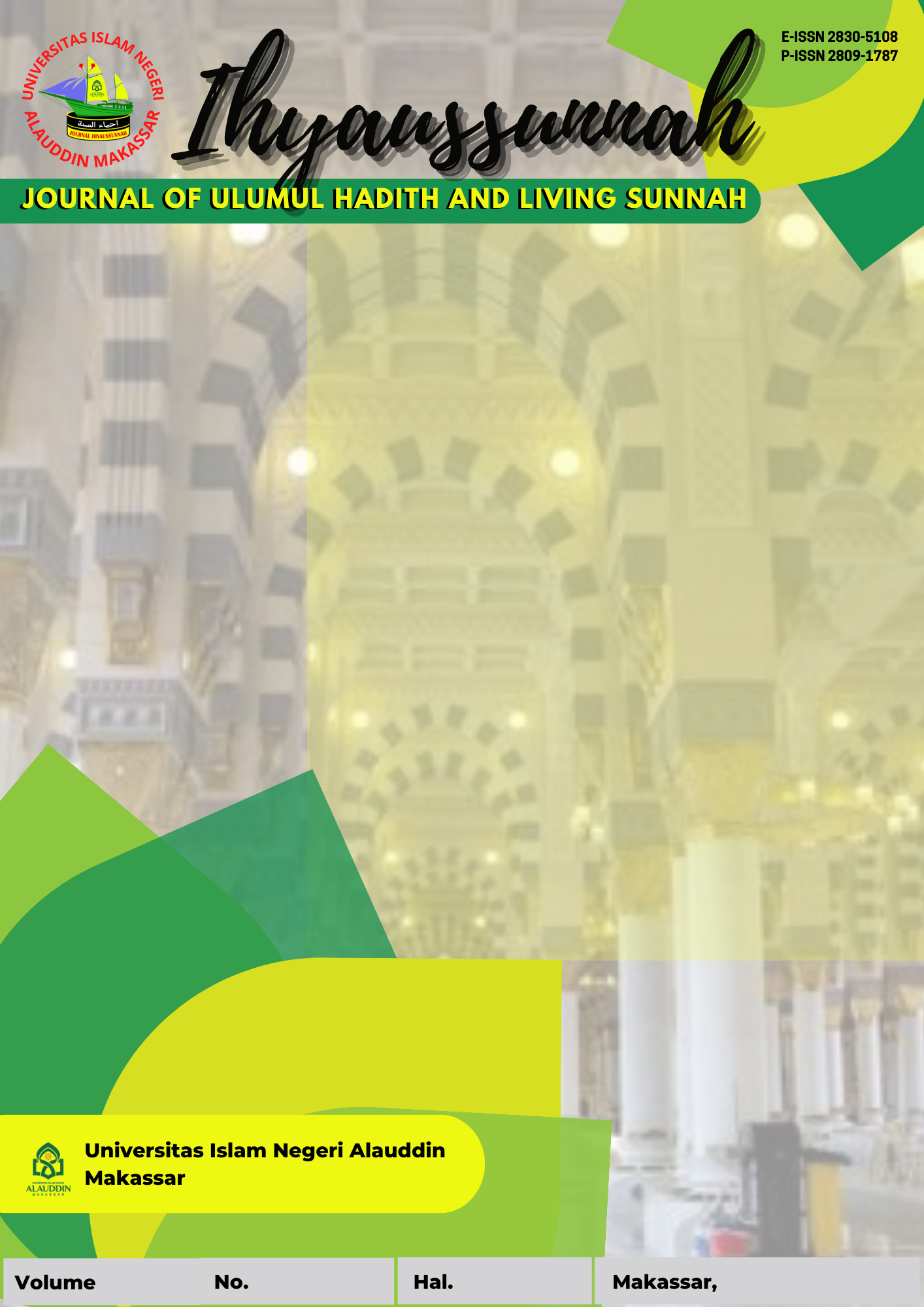Implementasi Etika Makan dalam Perspektif Hadis Nabi saw: Studi Living Sunnah pada Konsumen Kantin UIN Alauddin Makassar
Abstrak
This paper explores the implementation of ethical eating based on the Prophet's hadith, focusing on consumer behavior at the UIN Alauddin Makassar canteen. The purpose of this paper is to identify hadiths related to food ethics, assess their quality, and examine their implementation among canteen consumers. The research methodology employed in this paper is a combination of literature review and field study. The study's findings are as follows: 1) By using two different methods, researchers identified 11 hadiths. 2) The overall quality of the hadiths related to the ethics of eating is considered maqbul. Among the 11 hadiths, one has been classified as hasan based on its narrators, while the rest are classified as sahih. 3) The application of the understanding of the hadiths related to the ethics of eating among the canteen consumers of UIN Alauddin Makassar involves reciting the bismillah (prayer) and using the right hand while eating, which are observed by the majority. Blowing on food is practiced by some but not all consumers. Similarly, eating and drinking while standing is common among 91.2% of the consumers, while 8.7% do not observe this. Some consumers eat excessively, while others do not. However, certain actions such as eating with three fingers, criticizing food, reaching for distant food, leaving food during the call to prayer, and eating from a shared plate are generally avoided. One common behavior observed is talking while eating, which is usually not separated from the act of eating.
##plugins.generic.usageStats.downloads##
Referensi
‘A
al-‘Arabi@, Jumhu>riyah Mis}ri. al-Mu’jam al-Waji@z, Mesir: Maktabah Syuru>q al-Dauli@yah, 2012.
Adam, Lewis Mulford. New Master Victorial Encyclopedia, Jilid III, (New York : Me Graw Hill Book Co., 1974.
Alfan, Muhammad. Filsafat Etika Islam, Cet. I; Bandung: Pustaka Setia, 2011.
al-Sijista>ni@, Abu> Da>wu>d Sulaima>n bin al-Asy’as\ bin Ish}a>q. Sunan Abi@ Da>wu>d, Juz 4, Bairu>t: al-Maktabah al-‘As}riyah, t.th.
Anis, Ibrahim. al-Mu’jam al-Wasi@t}, Mesir: Da>r al-Ma’arif, 1972.
al-Asyhar, Thobieb. Bahaya Makanan Haram: Bagi Kesehatan Jasmani dan Kesucian Rohani, Cet. I; Jakarta: P>.T. Al-Mawardi Prima, 2003.
al-Bukha>ri@, Abi@ ‘Abdulla>h Muhammad bin Isma>’i@l. al-Ja>mi’ al-S}ah}i@h al-Bukha>ri@, Juz VII, Cet. I, al-Qa>hirah: al-Maktabah al-Salafiyah, 1400 H.
al-D{aha>k, Muhammad bin ‘I
Departemen Pendidikan Nasional, Kamus Bahasa Indonesia, Jakarta: Pusat Bahasa, 2008.
Elkarimah, Mia Fitriah. “Kajian Al-Qur’an dan Hadist Tentang Kesehatan Jasmani dan Ruhani”, Tajdid 15, no, 1 (2016): h. 108.
Fadhil, Aulia. Table Manner: Tata Cara dalam Etika Makan, Cet. I; Yogyakarta: Penerbit Gaya Media, 2018.
Fauzia, Ika Yunia. Etika Bisnis Islam Era 5.0, Cet. I; Depok: Raja Wali Press, 2021.
al-Gaza>li@, Abu Hamid. Ih}ya> ‘Ulm al-Di@n, Juz 3 (Beirut: Da>r al-Fikr, t.th.
al-Ghazali, Imam. Ih}ya’ ‘Ulumuddin (Menghidupkan Kembali Ilmu-ilmu Agama) jilid 3, Cet. I; Jakarta: Republika Penerbit, 2011.
al-H{a>fiz, Muhammad bin Yazi@d al-Rabi’i@ maula>hum al-Qazwaini@ Abu> ‘Abdulla>h Ibn Ma>jah. Sunan Ibnu Majah, Cet. I; al-Riya>d}: Maktabat al-Ma‘a>rif Lilnas\r wa lal-Tauzi@, t.th.
Hamka, Tafsir al-Azhar, Cet. I; Jakarta: Gema Insani, 2015.
Kementerian Agama RI., al-Qur’an dan Terjemahnya, Cet. I; Bandung: Syamil Quran, 2012.
al-Khura>sa>ni@, Abu> ‘Abd al-Rah}man Ahmad bin Syu’aib bin ‘Ali@. Sunan al-Nasa>i@, Juz 1, Cet. III; H{alab: Maktab al-Muat}bu>’a>t al-Isla>miyah, 1406 H/ 1986 M.
Mangesti, Yovita Arie. “Perlindungan Hukum Pemberian Hak Cipta Atas “Salam Namaste” Sebagai Penguatan Identitas Sosial Berbasis Kearifan Lokal”, Mimbar Keadilan 14, no. 1 (2021): h. 17-19.
Munawwir, Ahmad Warson. Kamus al-Munawwir Arab-Indonesia Terlengkap, Cet. IV; Surabaya: Pustaka Progressif, 1997.
al-Qazwi@ni@, Abu> ‘Abdulla>h Muhammad bin Yazi@d. Sunan Ibnu Majah, Juz 2, Da>r Ih}ya>’ al-Kita>b al-‘Arabiyah, t.th.
Septiyanti dan Seniwati,”Obesitas dan Obesitas Sentral pada Masyarakat Usia Dewasa di Daerah Perkotaan Indonesia,” Jurnal Ilmiah Kesehatan 2, no. 3 (2020): h. 119.
Setiawan, Rudi. “Makan Sebagai Aktivitas Produktuf: Tinjauan Filosofis Tentang Makan dari Perspektif Foucaultian”, Melintas 31, no. 2 (2015): h. 323.
Shaliba, Jamil. al-Mu’jam al-Falsasafi, Juz 1, Mesir: Da>r al-Kitab al-Mis}ri@, 1978.
Shihab, M. Qiraish. Tafsir al-Misbah (Pesan, Kesan, dan Keserasian al-Qur’an), Volume 8, Jakarta: Lenetra Hati, 2002.
Shihab, M. Quraish. Wawasan Al-Qur’an (Tafsir Maudhui atas Pelbagi Persoalan Umat), Cet. I; Bandung: Penerbit Mizan, 1996.
St. Aisyah BM, antara Akhlak, Etika dan Moral, Cet. I; Makassar: Alauddin University Press, 2014.
Syaikh, Abdullah bin Muhammad bin Abdurrahman Alu. Tafsir Ibnu Katsir, Jilid 1, (Cet. I; Jakarta: Pustaka Imam Asy-Syafi’i, 2008.
##submission.copyrightStatement##
##submission.license.cc.by-sa4.footer##Copyright
Authors who publish with IHYAUSSUNNAH JOURNAL OF ULUMUL HADITH AND LIVING SUNAH agree to the following terms:
- Authors retain copyright and grant the journal right of first publication with the work simultaneously licensed under a Creative Commons Attribution License (CC BY-SA 4.0) that allows others to share the work with an acknowledgment of the work's authorship and initial publication in this journal.
- Authors are able to enter into separate, additional contractual arrangements for the non-exclusive distribution of the journal's published version of the work (e.g., post it to an institutional repository or publish it in a book), with an acknowledgment of its initial publication in this journal.
- Authors are permitted and encouraged to post their work online (e.g., in institutional repositories or on their website) prior to and during the submission process, as it can lead to productive exchanges, as well as earlier and greater citation of published work.


